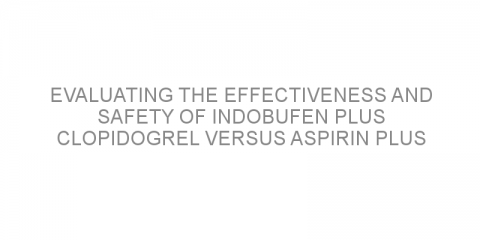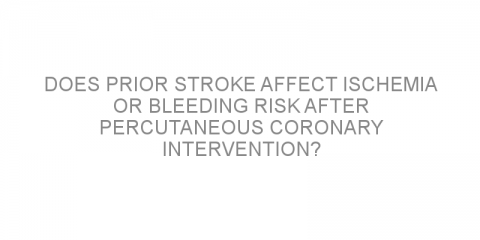In a nutshell This study evaluated the effectiveness and safety of indobufen (Ibustrin) plus clopidogrel (Plavix) versus aspirin plus clopidogrel in patients with negative cardiac troponin undergoing percutaneous coronary intervention (PCI) with drug-eluting stent (DES). The data showed that indobufen plus clopidogrel significantly reduced the risk of...
Read MoreTreatment(s) now being considered-Percutaneous coronary intervention (PCI) Posts on Medivizor
Evaluating the effectiveness and safety of a shorter dual antiplatelet therapy duration after coronary stenting in patients with acute or recent heart attack at high bleeding risk.
In a nutshell This study evaluated the effectiveness and safety of a shorter dual antiplatelet therapy (DAPT) duration after percutaneous coronary intervention (PCI) using drug-eluting stents (DES) in patients with acute or recent myocardial infarction (MI; heart attack) at high bleeding risk. The data showed that a shorter DAPT duration (1 month)...
Read MoreComparing the long-term outcomes of percutaneous coronary intervention with everolimus-eluting stents versus coronary artery bypass grafting in patients with mutltivessel coronary artery disease.
In a nutshell This study compared the long-term outcomes of percutaneous coronary intervention (PCI) using everolimus (Afinitor)-eluting stents (Xience) versus coronary artery bypass grafting (CABG) in patients with multivessel coronary artery disease (CAD). The data showed that both treatments were associated with a similar risk of heart attack, stroke,...
Read MoreEvaluating the effect of patient-reported physical and mental health status before PCI/CABG on their long-term outcomes
In a nutshell This study evaluated the effect of patient-reported physical and mental health status before revascularization procedures such as percutaneous coronary intervention (PCI) or coronary artery bypass grafting (CABG) on their long-term outcomes in patients with coronary artery disease (CAD). The data showed that...
Read MoreComparing the effectiveness and safety of short-term versus long-term dual antiplatelet therapy after percutaneous coronary intervention in patients at high bleeding risk.
In a nutshell This study compared the effectiveness and safety of short-term versus long-term dual antiplatelet therapy (DAPT) after percutaneous coronary intervention (PCI) using drug-eluting stents (DES) in patients at high bleeding risk. The data showed that short-term DAPT significantly reduced the risk of bleeding compared with long-term DAPT...
Read MoreIs clopidogrel better than ticagrelor in reducing bleeding in stabilized patients with myocardial infarction undergoing percutaneous coronary intervention ?
In a nutshell This study investigated if de-escalation (reducing the intensity) of dual antiplatelet therapy (DAPT) with clopidogrel (Plavix) might be better than ticagrelor (Brilique)-based antiplatelet therapy in stabilized patients with acute myocardial infarction (MI; heart attack) undergoing percutaneous coronary intervention (PCI). The data...
Read MoreWhich heart procedure has better outcomes in patients with diabetes and heart disease?
In a nutshell This study compared two heart interventions for people with coronary heart disease and type 2 diabetes (T2D). It found that coronary artery bypass grafting (CABG) led to better long-term outcomes than placing a stent in these patients. Some background Coronary heart disease (CHD) is a condition in which the arteries which supply blood to...
Read MoreDoes ticagrelor alone reduce bleeding risk after percutaneous coronary intervention?
In a nutshell This study investigated the effect of ticagrelor (Brilique) with or without aspirin after a percutaneous coronary intervention (PCI). They found that ticagrelor alone reduced bleeding risk after PCI. Some background Coronary artery disease (CAD) is caused by blockages in the coronary arteries. This reduces blood flow...
Read MoreDoes prior stroke affect ischemia or bleeding risk after percutaneous coronary intervention?
In a nutshell This study investigated the risk of ischemia (IR) or bleeding (BR) after stroke in patients undergoing percutaneous coronary intervention (PCI). They found that patients with prior stroke had higher IR/BR after PCI. Some background Coronary artery disease (CAD) is caused by blockages and reduced blood flow to the heart....
Read MoreA review of 5-year outcomes after PCI or CABG intervention for left main coronary disease
In a nutshell This study investigated outcomes after 2 surgical interventions to treat coronary artery disease (CAD) in the left main artery. They found no difference in outcomes after percutaneous coronary intervention (PCI) or coronary artery bypass graft (CABG) in these patients. Some background Coronary artery disease (CAD) is caused by...
Read MoreP2Y12 inhibitors – is monotherapy a safe management strategy after percutaneous coronary intervention?
In a nutshell This study investigated the effect of dual antiplatelet therapy (APT) compared to P2Y12 inhibitors on outcomes after a percutaneous coronary intervention (PCI). They found that the rate of cardiac events was similar in patients treated with P2Y12 inhibitors or dual APT. Some background Coronary artery disease (CAD)...
Read MoreThe effects of widening blood vessels on maximum blood flow to the heart in patients with coronary artery disease
In a nutshell This study aimed to investigate the effects of percutaneous coronary intervention (PCI) and coronary artery bypass grafting (CABG) on maximum blood flow in patients with coronary artery disease (CAD). The main finding of the study was that these procedures stopped the decrease in maximum blood flow through the heart arteries. Some...
Read More













